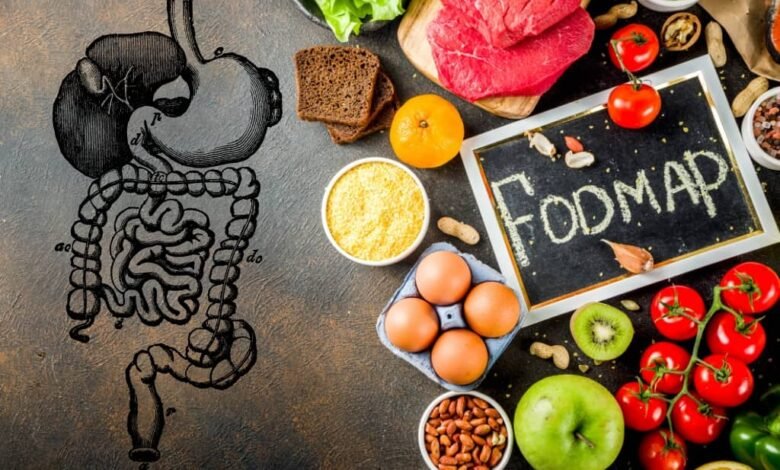Low FODMAP Diet for Irritable Bowel Syndrome (IBS)

Introduction to Low FODMAP Diet
IBS is a condition that affects the digestive system. It can cause abdominal pain, diarrhea and constipation. The Low FODMAP Diet for Irritable Bowel Syndrome aims to improve symptoms of IBS by reducing the number of carbohydrates consumed in your diet. In addition to improving digestive issues, there may be other benefits associated with this approach as well including reduced inflammation throughout the body and possibly prevention of colon cancer.
What is the Low FODMAP Diet for Irritable Bowel Syndrome?
The low FODMAP diet is very restrictive temporary eating plan that helps people with irritable bowel syndrome (IBS) reduce their symptoms. – Hazel Galon Veloso. People who suffer from IBS experience abdominal pain and changes in their bowel movements, which can be hard to live with. The Low FODMAP diet likely will improve symptoms if you have IBS.
The exact cause of this disorder isn’t known, but it’s believed to be related to the number of dietary sugars, oligosaccharides and disaccharides consumed by someone who has ongoing digestive issues.
While these foods don’t provide calories themselves, they may contribute to bloating or discomfort after eating them when digested too quickly or absorbed too quickly by your body (which happens when they’re consumed without food).
The National Library of Medicine says that avoiding foods high in lactose or fructose should help improve symptoms because they’re likely to cause gas production that adds stress on already sensitive tissues in your intestines.”
Who Need Low FODMAP Diet?
People who suffer from Irritable Bowel Syndrome (IBS) experience abdominal pain and changes in their bowel movements. The Low FODMAP diet likely will improve symptoms if you have IBS.
Irritable bowel syndrome (IBS) is a common gastrointestinal condition that affects at least 10 percent of the U.S. population. It’s characterized by symptoms like abdominal pain, cramping and diarrhea or constipation alternating with periods of relief from pain and discomfort.
IBS can be triggered by various factors including stress, overuse of digestive enzymes or other medications, food additives such as monosodium glutamate (MSG), lactose intolerance or gluten sensitivity in those who are intolerant to gluten foods like wheat products such as bread and pasta made with wheat flour—and even certain medications such as antibiotics!
The low FODMAP diet may help relieve symptoms because it limits certain carbohydrates found in many foods that are high in FODMAPs: fructose-containing fruits (apples), pears/peaches/plums; fructans found naturally in legumes such as beans & lentils; Galatians which occur naturally when you ferment foods like dairy products or onions; xylose found primarily in starchy vegetables like corn but also some cereals such as cornflakes.”
Whats FODMAP?
The acronym FODMAP stands for Fermentable Oligosaccharides, Disaccharides, Monosaccharides And Polyols. These are groups of carbohydrates that are poorly absorbed in the small intestine. This can lead to excessive water in the small intestine, which may result in diarrhea.
FODMAPs are carbohydrates that aren’t digested well by some people, causing digestive distress and other uncomfortable symptoms. While the cause of IBS is unknown, a person with this problem may not fully digest certain foods that contain FODMAPs.
FODMAPs are short-chain carbohydrates that are not digested well by some people. If you have IBS, you may be sensitive to these foods.
Some examples of FODMAPs include:
- fructose (found in apples, pears, honey and high fructose corn syrup)
- lactose (found in milk products)
The main reason to try the Low FODMAP diet is to improve your symptoms of IBS. However, there are other benefits associated with this approach. And some evidence suggests it could help reduce inflammation throughout the body and possibly prevent colon cancer.
The Low FODMAP diet restricts certain carbohydrates called FODMAPs (fermentable oligosaccharides, disaccharides and monosaccharides). These are found in many foods that we eat every day — wheat products like bread, rice or pasta; dairy products such as milk or yogurt; fruits such as apples or bananas; vegetables like onions and leeks as well as legumes such as lentils and pulses (beans).
A review of studies published earlier this year found that following a Low FODMAP diet improved symptoms in 44 out of 55 studies reviewed. A Cochrane Database System Review of 17 randomized controlled trials published in July 2018 found that patients who followed a Low FODMAP diet had significant improvement in their symptoms when compared to those who did not follow a low-FODMAP diet.
The acronym FODMAP stands for Fermentable Oligosaccharides, Disaccharides, Monosaccharides And Polyols. These are short chains containing two or more sugars joined together by an indigestible bond called alpha-1-2 glycosidic linkages (e.g., fructans).
Fructans are found in many foods such as wheat flour, garlic and onion seeds; they may be responsible for some cases of irritable bowel syndrome (IBS) because they cause fermentation in the large intestine which can lead to gas production and abdominal pain or discomfort.
What foods are not allowed on a low Fodmap diet?
Foods that are not allowed on a low-FODMAP diet include:
- Dairy foods such as milk, ice cream and yogurt (except for small amounts of hard cheese like cheddar)
- Wheat based products such as bread, cereal, crackers
- Milk alternatives such as soy milk and rice milk. (Almond milk is fine).
- Lentiss and beans
- Sugar-free foods that contain insulin (such as gum and candy)
- Fruit, except for small amounts of canned fruit in natural juice or unsweetened applesauce.
- Vegetables such as asparagus, onions, garlic and dried mushrooms.
- Conclusion
If you have IBS and want to try the Low FODMAP diet, talk to your doctor. Your doctor may be able to recommend a practitioner who specializes in this approach or provide other resources that can help you succeed in this lifestyle change. Follow our website for more health and fitness topics.
